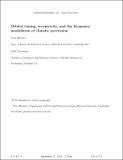| dc.contributor.author | Huybers, Peter John | |
| dc.contributor.author | Aharonson, Oded | |
| dc.date.accessioned | 2012-09-26T14:50:46Z | |
| dc.date.issued | 2010 | |
| dc.identifier.citation | Huybers, Peter and Oded Aharonson. 2010. Orbital tuning, eccentricity, and the frequency modulation of climatic precession. Paleoceanography 40:PA4228. | en_US |
| dc.identifier.issn | 0883–8305 | en_US |
| dc.identifier.uri | http://nrs.harvard.edu/urn-3:HUL.InstRepos:9639972 | |
| dc.description.abstract | The accuracy of geologic chronologies can, in principle, be improved through orbital tuning, the systematic adjustment of a chronology to bring the associated record into greater alignment with an orbitally derived signal. It would be useful to have a general test for the success of orbital tuning, and one proposal has been that eccentricity ought to covary with the amplitude envelope associated with precession variability recorded in tuned geologic records. A common procedure is to filter a tuned geologic record so as to pass precession period variability and compare the amplitude modulation of the resulting signal against eccentricity. There is a reasonable expectation for such a relationship to be found in paleoclimate records because the amplitude of precession forcing depends upon eccentricity. However, there also exists a relationship between eccentricity and the frequency of precession such that orbital tuning generates eccentricity-like amplitude modulation in filtered signals, regardless of the accuracy of the chronology or the actual presence of precession. This relationship results from the celestial mechanics governing eccentricity and precession and from the interaction between frequency modulation and amplitude modulation caused by filtering. When the eccentricity of Earth's orbit is small, the frequency of climatic precession undergoes large variations and less precession energy is passed through a narrow-band filter. Furthermore, eccentricity-like amplitude modulation is routinely obtained from pure noise records that are orbitally tuned to precession and then filtered. We conclude that the presence of eccentricity-like amplitude modulation in precession-filtered records does not support the accuracy of orbitally tuned time scales. | en_US |
| dc.description.sponsorship | Earth and Planetary Sciences | en_US |
| dc.language.iso | en_US | en_US |
| dc.publisher | American Geophysical Union | en_US |
| dc.relation.isversionof | doi:10.1029/2010PA001952 | en_US |
| dash.license | OAP | |
| dc.subject | orbital tuning | en_US |
| dc.subject | precession | en_US |
| dc.subject | eccentricity | en_US |
| dc.title | Orbital Tuning, Eccentricity, and the Frequency Modulation of Climatic Precession | en_US |
| dc.type | Journal Article | en_US |
| dc.description.version | Accepted Manuscript | en_US |
| dc.relation.journal | Paleoceanography | en_US |
| dash.depositing.author | Huybers, Peter John | |
| dc.date.available | 2012-09-26T14:50:46Z | |
| dc.identifier.doi | 10.1029/2010PA001952 | * |
| dash.contributor.affiliated | Huybers, Peter | |


